Are you an avid scrapper? To get into this interesting side hustle, you should know the latest catalytic converter scrap prices. You can make quite a nice chunk of change with how cat converters sell right now.
Currently, the average price for catalytic converters is over $160 each. However, the cost can vary from $60 to over $200 for domestically-made cat converters, depending on whom you ask.
Read on to learn more about how much scrap catalytic converters can sell. This way, you will know what to look for the next time you go to the scrapyards.
Where Can You Find Catalytic Converter Scrap Prices?
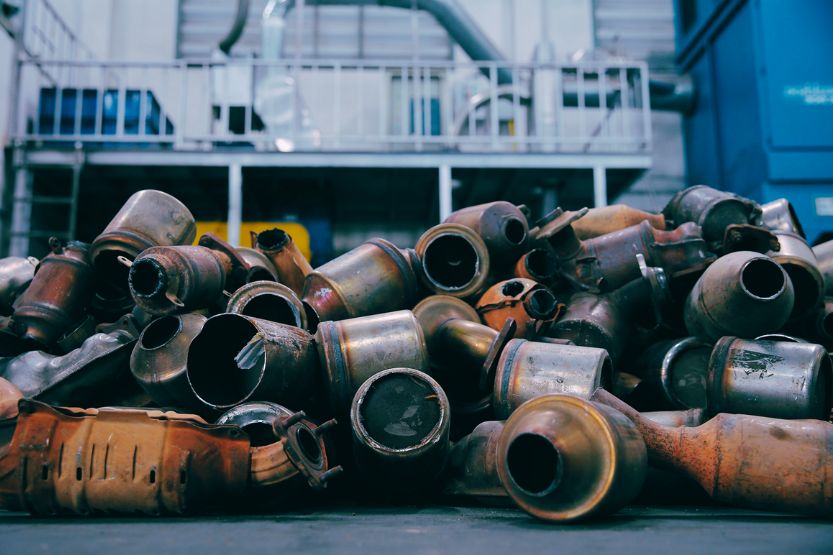
Hunting for and selling junk car parts can be quite a fun and rewarding hobby. However, keeping up to date with the current prices of scrap parts can be tricky. You can make it easier by knowing exactly where to look.
You’re sitting on a lot of money if you come across several catalytic converters. The problem is that asking potential buyers what they can pay will make most of them lowball you. How can you be sure that you are getting a fair price?
Luckily, the internet has got your back. You can do a simple catalytic converter price lookup via many online databases. Research your specific make and model to get more accurate prices for which you can sell your catalytic converter.
Check your online resources regularly, though. The reason is that the catalytic converter value can fluctuate almost daily.
Why Are Catalytic Converters Expensive?
Are you still unfamiliar with cars and car parts? Then you might not be aware of why the average catalytic converter value is so high.
The reason is not just because it is a complex and intricate vehicle component. Their actual value stems from the precious metals that are inside them. The precious metals that you would typically find in catalytic converters include:
1. Platinum
Platinum is one of the most important components of the catalytic converter. It is a common material for catalytic converters because it is highly reactive to engine emissions. When exposed to emission fumes, the platinum turns the once-harmful gases into harmless water vapor.
Essentially, platinum starts the conversion process that turns the carbon dioxide and carbon monoxide into harmless water vapor. If you notice water dripping from your tailpipe, your catalytic converter works as intended.
What is essential is to learn that platinum is simply a catalyst. This means it only jumpstarts the chemical reaction but is not an ingredient. Even if the catalytic converter has become too old and no longer efficient, platinum amounts are the same.
It will still have the same amount of platinum inside it as when it was brand new.
Here is the thing. If you have an old car, replacing its catalytic converter would not be worth it. It would be almost worth the same as the entire vehicle. Buying an entirely new vehicle will be better unless it has a lot of sentimental value.
As you probably already know, platinum is quite rare, making it expensive. These days, platinum might not be quite as precious as gold. However, its price is volatile, so that it might bounce back later. As of this writing, the cost of platinum is around $30 per gram.
2. Palladium
Platinum is not the only precious metal that acts as a catalyst. Palladium is one of them. It is more expensive than gold and almost twice as valuable.
Palladium is one of the rarest metals in the world. It is also one of the by-products of platinum and nickel mining. Aside from its rarity, palladium also has a lot of different uses.
Aside from catalytic converters, it is also possible to use palladium to make semiconductors.
Palladium is so rare and has a high demand worldwide. With that said, it is no longer surprising to see it being more expensive than gold and platinum. As of this writing, a gram of palladium costs US$72.79.
3. Rhodium
Rhodium is one of the three main catalysts in catalytic converters, including platinum and palladium. This metal also has a lot of industrial uses, the chief of which is for making acids. This makes it a pretty desirable and sought-after material.
Rhodium is mainly responsible for turning toxic nitrogen oxide into completely harmless nitrogen and oxygen. Nitrous oxide is one of the gases that emission tests look out for. If an excessive amount of it is found, your catalytic converter may no longer work as intended.
It might not be quite as popular as platinum and gold. However, rhodium is much more precious than most other precious metals. Currently, rhodium costs a whopping $453 per gram. However, two months ago, rhodium’s price peaked at more than US$22k per ounce.
Catalytic Converter Scrap Prices
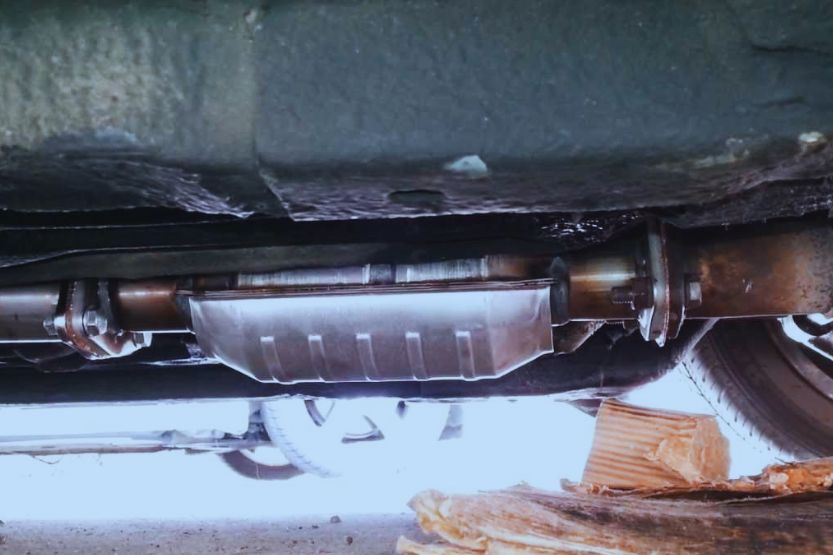
1. Honda
Honda cars have quite efficient catalytic converters, especially the ones that came with their hybrid vehicles. Hybrids need to have extremely low emissions. Their engines are highly fuel-efficient and assisted by a separate electric motor.
In addition, they need highly-efficient catalytic converters to remove the minimal amounts of engine emissions that pass through the exhaust.
The best price for a Honda catalytic converter would be around $200 if it came from a compact sedan. It will also be about $500 if it comes from a large displacement engine or a truck.
2. GM
There is no standard size for GM catalytic converters. It will depend on the size and displacement of the engine of the car. The larger the vehicle, the more expensive the catalytic converter will be.
When you have a larger catalytic converter, you will have more precious metal content. The best price for a GM cat is around $120 for a sedan. You can also get up to $350 for a large catalytic converter.
3. Ford
Ford was caught in a scandal a couple of months ago. There were allegations that the company placed “cheating devices” in their cars to lower the emissions of their diesel engines.
Those allegations proved true; since then, Ford has vowed to do things properly. This meant they used proper catalytic converters in their internal combustion engines.
The ones that come in the newer Mustangs are quite large. This means they can fetch a reasonable price from scrap buyers. You can get up to $340 for a good-condition Ford cat converter.
4. Ford F150
The Ford F150 is quite a large truck. Depending on the engine, it can have quite a large catalytic converter. Getting the converter from an old diesel truck will be more valuable.
On average, the best price that you can get for a Ford F150 cat is around $345 each. This will depend on the condition and to whom you are talking.
5. Toyota
Toyota catalytic converters are among the most efficient ones in the market today. This is especially true for those that come stock with the Prius. These cat converters have some of the highest amounts of precious metals. This is the reason why even their scrap prices are pretty high.
You can typically get more than $600 for a good-condition Toyota catalytic converter. Just make sure that you know how to strike a good deal.
6. BMW
European brands like BMW have to adhere to stricter emission laws. This is for them to have better and more efficient catalytic converters. In other words, more precious metals are in their catalytic converters, allowing them to fetch a higher scrap price.
You can usually sell foreign BMW catalytic converters for up to $670. However, if you have an exotic catalytic converter, you can sell those for up to $1,100 each, just for scrap. You can often get this converter from sportscars.
7. Chrysler
There are only two Chrysler car models today – the 300C and the Pacifica minivan. Both these models have large-displacement engines. This means they will need to use large and efficient catalytic converters.
You can typically sell Chrysler catalytic converters at a scrap price of up to $320 each. However, Chrysler catalytic converters are rather hard to come by. If you find one, even in poor condition, don’t pass on it.
Again, what’s a scrap catalytic converter worth? On average, the catalytic converter’s scrap price is $160. Other scrap aftermarket cat converters’ price is $60 to $200, while large and rare models can reach $1100.
Why Do Cars Need Catalytic Converters?
You can find your car’s catalytic converter underneath your vehicle. It is connected to the exhaust system and between the manifold and muffler.
The catalytic converter is either beaded or shaped like a honeycomb. A metal catalyst, typically a combination of platinum, palladium, and rhodium, also serves as its coating.
When exhaust fumes pass through the catalytic converter, two processes happen. First, the metal catalysts trigger a reaction that separates the molecules of the harmful nitrogen oxide into nitrogen and oxygen.
The nitrogen then gets trapped inside the converter while letting the oxygen pass through the muffler.
After that, oxidation happens. Then, the number of unburned hydrocarbons and carbon monoxide within the converter is reduced.
In essence, the catalytic converter filters the harmful fumes in the exhaust gases and burns them up. This will prevent them from getting released into the atmosphere.
Aside from cleaning your car’s emissions, the catalytic converter also helps improve the engine’s fuel efficiency. If you take good care of your vehicle, it will also help extend the service lifespan of your catalytic converter. This will result in you being able to use it for many more years.
Why Catalytic Converters Are Stolen from Cars
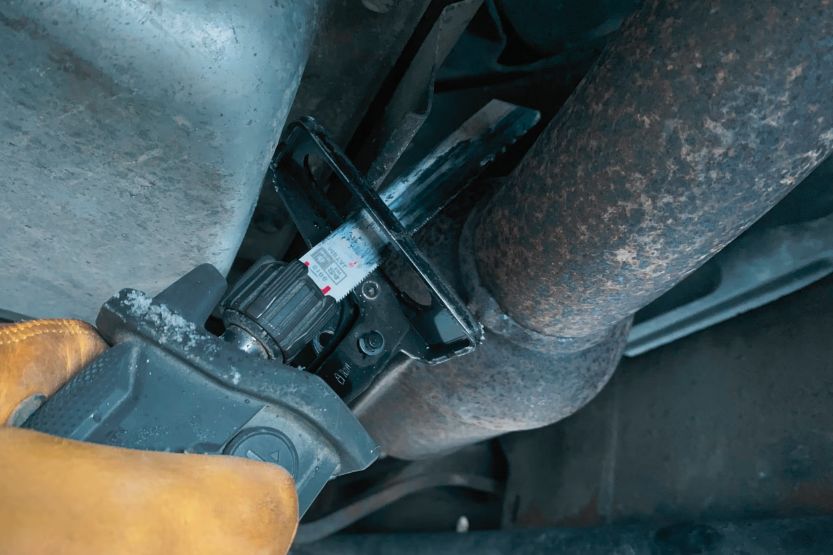
You might have heard in the news that catalytic converter thefts have been rising recently. Now, the question is, why is it happening? Aside from the obvious, there are many other reasons why catalytic converter thefts are on the rise:
1. Contains Lots of Precious Metals
As mentioned earlier, catalytic converters contain several kinds of precious metals. These include platinum, palladium, and rhodium. An average catalytic converter usually has around 3 to 7 grams of platinum.
It also consists of 2 to 7 grams of palladium and a gram or two of rhodium. An average catalytic converter, therefore, has at least a thousand dollars in precious metals. You can sell a converter for hundreds of dollars. The buyer can also make a good chunk of change from it.
2. Easy to Remove
A skilled thief with a regular hacksaw can remove this converter from a parked car in just a few minutes. It gets even quicker when using a cordless power saw. This is especially true when it comes to SUVs. The reason is that the thieves do not need to jack up the car to reach the catalytic converter.
3. Demand
The biggest reason why catalytic converter thefts are on the rise is that there are companies that buy stolen items.
Aside from being easy to remove from underneath parked cars, thieves can also dispatch their stolen goods almost immediately. They bring their stolen catalytic converters and get hundreds of dollars in return.
Also, most places that buy these stolen catalytic converters do not even check if they’re stolen. The reason is that they will not be reselling these items anyway.
Most of these places would only extract the precious metals from the catalytic converters they buy. Although they will need to spend a bit processing the converters, it is much easier than selling them whole.
Can Your Car Run Without a Catalytic Converter?
If you are short on cash, could you hacksaw the catalytic converter off your car and sell it? How will it affect the performance of your vehicle?
If you are asking if your car will still be able to run, yes, it will still run. The catalytic converter does not directly affect how the engine will work. It just essentially filters the emissions from the engine. This means that you will be able to start the engine. You can also drive your car as you usually do.
However, removing the catalytic converter comes with a couple of caveats. One is that your car will not have the same fuel efficiency as it originally had. The reason is that the exhaust system will be all out of whack. After all, you essentially cut the exhaust system in half.
In addition, a constant check engine light will constantly inundate you. There are several sensors in the exhaust system. If they cannot get a regular reading, the car’s computer will turn on the check engine light.
Frequently Asked Questions (FAQs)
Where Can You Sell Salvaged Catalytic Converters?
There are usually several shops in any town that will buy catalytic converters. However, if you want to sell them quickly, you can find many buyers online:
How Much Does a Catalytic Converter Sell For?
It depends on a few factors. Among them are the catalytic converter’s size, the vehicle’s brand and model, and the car’s origin. On average, you can usually sell cat converters for at least $160 each.
The price would typically fluctuate up or down. This will depend on the cost of the precious metals inside the catalytic converters.
What Can You Get Charged for When Caught with A Stolen Cat Converter?
The theft, sale, or trafficking of stolen catalytic converters falls under a felony. This means you can face up to five years in prison for it. Never think you can make a quick buck out of diving under parked cars with a hacksaw. You may only get penalized for it.
What Vehicles Are Most Likely to Have Their Catalytic Converters Stolen?
On average, the most stolen catalytic converters are from the Ford F-series of trucks. Besides being large (thus containing more precious metals), the catalytic converters are also easy to get under these vehicles. You can do so even without a jack to access the converters.
In Closing – Catalytic Converter Scrap Prices
As of writing, the average price you can sell a catalytic converter is around $160 each. However, this also depends on the size of the catalytic converter and the type of vehicle it came from. In that case, you can sell certain kinds for up to $1,000 each.
Catalytic converter scrap prices are ludicrously high because they contain significant amounts of precious metals. These are platinum, palladium, and rhodium.
This is also why catalytic converter thefts have been rising as of late. However, if you can legally get your loose catalytic converters, you can make some extra money.

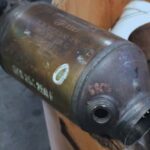
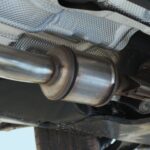


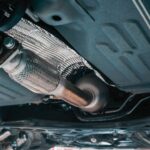

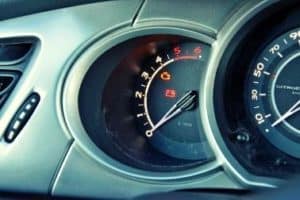

![Read more about the article Gas Leaks in Car [Causes and How to Fix]](https://roadsumo.com/wp-content/uploads/2021/08/gas-leaks-in-car-300x200.jpg)